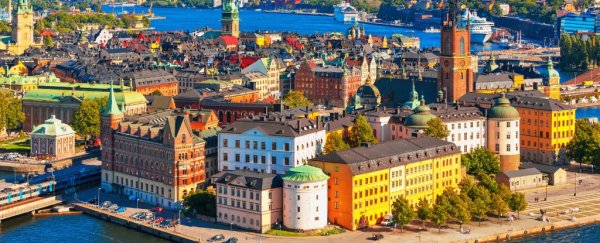The Swedish government announced this week that they will be spending an extra US$546 million on renewable energy and climate change action in their 2016 budget, with the aim of becoming one of the world's first nations to end its dependence on fossil fuels. They haven't set a deadline for this ambitious goal just yet, but last year the country announced plans to make its capital Stockholm fossil fuel-free by 2050, so we're imagining a similar time frame.
It may seem like a pretty big task, but the Scandinavian country already gets two-thirds of its electricity from non-fossil fuel energy sources - predominately hydroelectric and nuclear - and it will now be focussing on increasing its solar and wind energy potential, as well as making its transport industry more sustainable. The majority of the budget increase will be financed by heavier taxes on petrol and diesel fuel.
"Sweden will become one of the first fossil-free welfare states in the world," Prime Minister Stefan Löfven told the press. "When European regulations do not go far enough Sweden will lead the way."
The move comes after Sweden suffered extreme heatwaves last summer, and one of the worst bushfires in the country's history. The government has committed to taking action to protect its citizens from the effects of climate change in the future.
One of the most impressive winners in the new budget is solar energy, which has been allocated US$58.4 million per year between 2017 and 2019 - an eight-fold increase from its current budget, as Bloomberg Business reports.
The government also announced that it would be spending money on:
- smart grids
- renewable energy storage technology
- an electric bus fleet
- subsidies for green cars
- climate adaptation strategies
- renovating residential buildings to make them more energy efficient.
It's no coincidence that the move comes just a couple of months before the 2015 United Nationals Climate Change Conference, which will be held in Paris at the end of November.
"2015 is our opportunity, a chance to, in dialogue with all the countries of the world, change course towards a new development path where we can succeed in generating welfare for all, not at the planet's cost but in cooperation with it," a key adviser to the Prime Minister, Johan Rockström, said in a press briefing.
Although the big jump in spending is new for the country, Sweden already has a pretty impressive track record when it comes to climate change action. The government recently announced that several ageing nuclear power plants are scheduled for early closure, with no replacements planned. And just last month it was reported that an extra 144 MW of wind power capability had been added to the grid with the new Sidensjö wind farm.
What's most exciting is that Sweden is just one of many governments around the world getting behind renewable energy. Hawaii has announced its plans to become the first US state totally powered by renewables, and a city in Texas is also making the switch. Earlier this year, Costa Rica was powered with 100 percent renewable energy for 75 days, and Denmark successfully produced 140 percent of its electricity demand from wind power back in July.
But these influxes of renewable energy were achieved during extremely favourable conditions, and right now there's no way to store this energy for later use, which makes it hard to completely cut out fossil fuels. If Sweden has success in developing new energy storage technology, as they've committed to in their new budget, they could well lead the way. Let the race begin.
